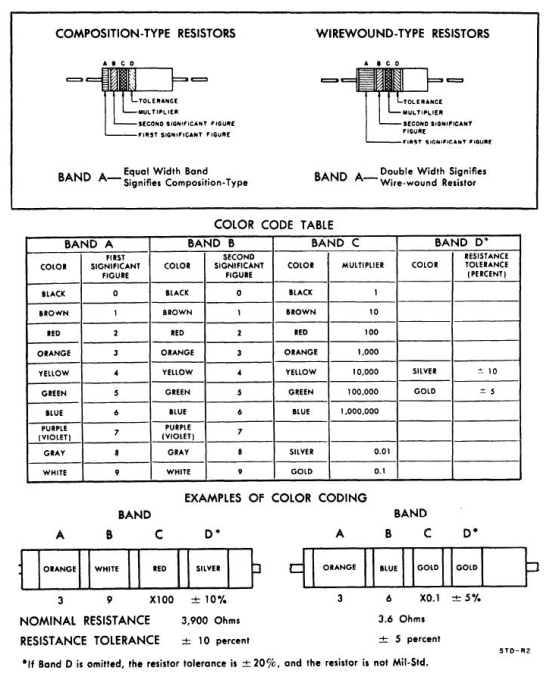Allen
Bradley resistors
Carbon
composite resistors
|

|
Allen Bradley 0,25 Watt, 5%
All these carbon composite resistors are mil spec made
Values
available:
51R, 150R, 200R, 680R, 470K, 22M
|
| €
0.40
ex.VAT |
€
0.50
incl.VAT |
each |
|

|
Allen Bradley 0,5 Watt, 5%
All these carbon composite resistors are mil spec made
Values
available:
2R7, 4R7, 20R, 22R, 33R, 47R, 75R, 82R, 100R(10%), 150R,
180R, 200R, 220R, 240R, 270R, 300R, 390R, 430R, 470R,
510R, 560R, 620R, 750R, 820R, 910R, 1K2, 1K5, 1K8, 2K4,3K9,
5K1, 5K6,
6K8, 8K2, 16K, 20K, 22K, 24K, 27K, 30K, 33K, 36K, 39K,
56K, 68K, 91K, 120K, 160K, 240K, 270K, 300K, 390K, 470K,
510K, 820K, 2M, 4M7
|
| €
0.83
ex.VAT |
€
1.00
incl.VAT |
each |
|

|
Stackpole 0,5 Watt, 5%
All these carbon composite resistors are mil spec made
Values
available:
39R, 47R, 100R, 100R(10%), 120R(10%), 180R(10%), 220R,
270R(10%), 560R(10%), 1K6, 1K8, 3K3(10%), 3K6 5K1, 6K8(10%),
10K, 39K, 82K(10%),
|
| €
0.83
ex.VAT |
€
1.00
incl.VAT |
each |
|

|
Allen Bradley 1 Watt, 5%
All these carbon composite resistors are mil spec made
Values
available:
27R, 220R, 240R, 300R, 560R, 680R, 4K7, 15K, 20K, 51K,
56K, 130K, 4M7 |
| €
1.25
ex.VAT |
€
1.50
incl.VAT |
each |
|

|
Stackpole 1 Watt, 5%
All these carbon composite resistors are mil spec made
Values
available:
300R
|
| €
1.25
ex.VAT |
€
1.50
incl.VAT |
each |
|

|
Allen Bradley 2 Watt,
All these carbon composite resistors are mil spec made
Values
available:
56R, 4K3, 180K.
|
| €
2.07
ex.VAT |
€
2.50
incl.VAT |
each |
|
| |

|
|
|
| Allen
Bradley resistors
Quantities of these "New Old Stock" carbon
composition resistors are limited. Production has now
ceased in the USA. Allen Bradley resistors have a huge
following of D.I.Y valve hi-fi builders and guitar amp
enthusiasts. A huge amount of old manufactured hi-fi
were built using these resistors, hence these antique
carbon resistors are close to the hearts of many. They
were used heavily in vintage Fenders, Marantz, etc.
Carbon Composition Resistors particularly those manufactured
by Allen Bradley are becoming more scarce and are in
high demand due to their unique characteristics. They
are known for their very clean and natural sound. Composite
resistors differ from film resistors in that they consist
of a little tube with a composite carbon resistor material
inside. This makes the resistance, so you only have
a few mm of material in the signal. A film resistor
is made by carving a channel into a carbon (or metal)
film on a glass or ceramic tube, resulting sometimes
in a few decimeters (feet) of material in the signal!
Also a film resistor always has some inductance, composite
resistors don't.
Because
of their very good sound we can recommend them in almost
all on all places, cathode resistors, low power anode
loads, etc. We would not advise to use them inside the
RIAA correction network. They are also highly recommended
in solidstate electronics.
If you are looking for a low cost, reliable, musical
resistor, look no further.
|
|
|
|